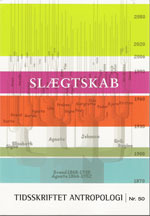PAKISTAN TUR-RETUR: Forhandlinger af hjem og tilhørsforhold inden for flergenerationsfamilien
DOI:
https://doi.org/10.7146/ta.v0i50.106940Resumé
This article inquires into the “homeland imaginary” of Pakistani who emigrated to
Denmark during the past four decades. In addition to the search for economic prosperity,
the generations of migrants have also created visions of the places they came from and
their relations to the family members left behind. The “homeland imaginary” gives
emphasis to the “good life” in the bosom of caring, extended families. Nostalgic yearning
to revitalize such family values, considered lost in Denmark, motivates some individuals
and families to return to Pakistan, where they, however, rarely find the good life or
homeland they imagined. Based on narratives recounted by members of three Pakistani
families who returned to Pakistan after living in Denmark, this paper discusses how
patriarchal authority, as well as notions of home and identity, are negotiated within the
extended family. The article then questions the conflation of popular and analytical
representations of the close-knit extended family found in the ethnographic literature
and outlines an analytical perspective of the extended family that includes multiple
subject positions based on age, gender and civil status that sheds new light on the
practices and visions of Pakistani family life.
Downloads
Publiceret
Citation/Eksport
Nummer
Sektion
Licens
Ophavsretten til artiklerne i Tidsskriftet Antropologi tilfalder forfatteren.
Artikler publiceret i Tidsskriftet Antropologi må citeres, downloades og videresendes for ikke-kommerciel brug, under forudsætning af normal akademisk reference til forfatter(e) samt tidsskrift, årgang, nummer og sider. Artiklerne må kun genudgives med eksplicit tilladelse fra forfatter(e) og tidsskriftet.


